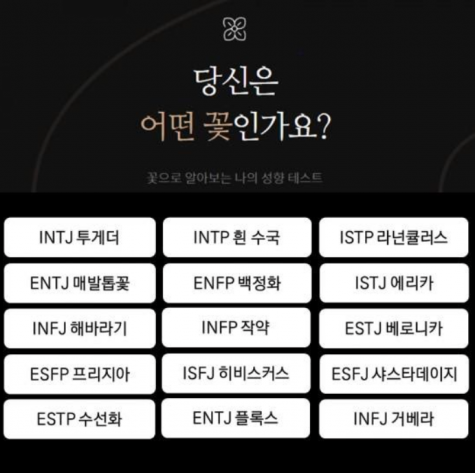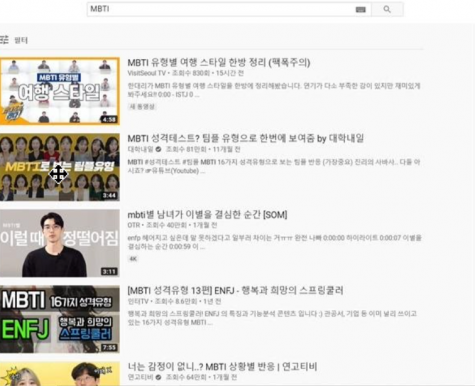Hot Topic in Korea Now: MBTI- Knowing Your Personality Type
March 24, 2021

Recently, there has been a craze among young people in South Korea, particularly the MZ generation (Millennial generation from the early 1980s to the early 2000s and generation Z from the mid-1990s to the early 2000s), for Myers-Briggs Type Indicator (MBTI).
MBTI is a self-reporting personality type test tool designed based on the psychological type theory of Swiss psychoanalyst Carl Jung.
A total of 16 personality types are presented according to four indicators: extroverts and introverts (E-I), sensors and intuitive (S-N), thinkers and feelers (T-F), and judgers and perceivers (J-P). The test can identify one’s personality types according to the tester’s record, such as whether he/she is outgoing or introverted, and which function they usually use, such as senses or intuition.
For example, an outgoing, sensuous, emotional, and judgmental person is an ESFJ type. This type of personality is a style with a lot of interest in people, is kind, and grows with others based on cooperation.
Contents related to MBTI are popular online. Some even classify characters in movies and dramas as MBTI or compare their personality types with their income. For example, the ESFP type is the ‘Gryffindor’ type of Hogwarts dormitory in Harry Potter. Among Disney princesses, “Ariel,” the mermaid’s main character, is the most similar to this type.
Especially, content based on MBTI is gaining popularity on SNS (Social Networking Service), and companies are marketing using MBTI. For example, Kakao Talk provided people with information on the types of gifts based on the MBTI, and Oak Valley also organized events for condo guests to enjoy the contents, relaxation, and leisure activities under the MBTI system.
Personality tests like MBTI are positive in terms of understanding oneself. “MBTI is one of the most popular tests in Korea right now,” said Paik Jong-woo, a professor of psychiatry at Kyung-Hee University Hospital.
“There is me that I know and me that others know, and in the realm of unconsciousness, there is me that I don’t know. There is a side that these tests help individuals to know themselves that they did not know. It is also a good idea to use these tests because personality affects the decision-making process a lot.” said Kyung-Hee.

MBTI has become popular this year among the MZ generation because face-to-face contact has decreased due to coronavirus. It is now easier to check personality types through smartphones and share them online. Also, personality tests are popular because the ‘who am I’ theme is important.
Lee Dong-gwi, a psychology professor at Yonsei University, said, “This generation is so interested in themselves that they are willing to open their wallets to what they like. Young people in Korea have a great desire to understand and know ‘who I am,'” he said. “Because there is a lot of information, and various choices are available when buying things or setting a career path, the awareness of ‘knowing me’ is becoming stronger.
In other words, people of these ages want to know their own emotions and desires to make the right choice. Therefore, people take personality tests or visit psychological testing cafes when they have concerns about career paths and relationships.”
The change in human relations in Korean society reflects the desire to understand each other. Ahn Beom-Hyun, head of the education department at the Korea MBTI Institute (KMI), said, “In vertical human relations, superiors do not need to understand subordinates, and subordinates need to do what superiors are told to do. However, these days, as horizontal relationships increase, individuals try to understand others and try to make others understand who I am,” he said.
